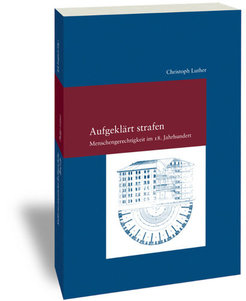Aufgeklärt strafen
Menschengerechtigkeit im 18. Jahrhundert

Menschengerechtigkeit im 18. Jahrhundert
Studien zur europäischen Rechtsgeschichte 294
[Enlightened Punishment
Human-fairness (Menschengerechtigkeit) in the 18th Century]
Christoph Luther
Studien zur europäischen Rechtsgeschichte 294
Frankfurt am Main: Klostermann 2016. XIX, 599 p.
ISSN 1610-6040
ISBN 978-3-465-04267-9
In the 18th century the legitimating foundation of criminal law shifted. The notion of societal utility replaced the traditional conception. Individual worldviews gained tremendous influence when it came to the content of doctrines of punishment. This study investigates the material and methodological legal understanding of the early phase of the practical reform of criminal law via the submissions to the 1777 Bern prize contest for the best draft of a penal law codification. The reform documents resembled one another on a phenomenological level, due to the fact that all of the authors wanted to treat the instruments of the early modern state. The presumed conceptions regarding the objects, content, and methods of law, on the other hand, deviated greatly. While a common “enlightened” understanding of law defies definition, a style of thinking, however, which to this day shapes the criminal law discourse, can be expressed.
